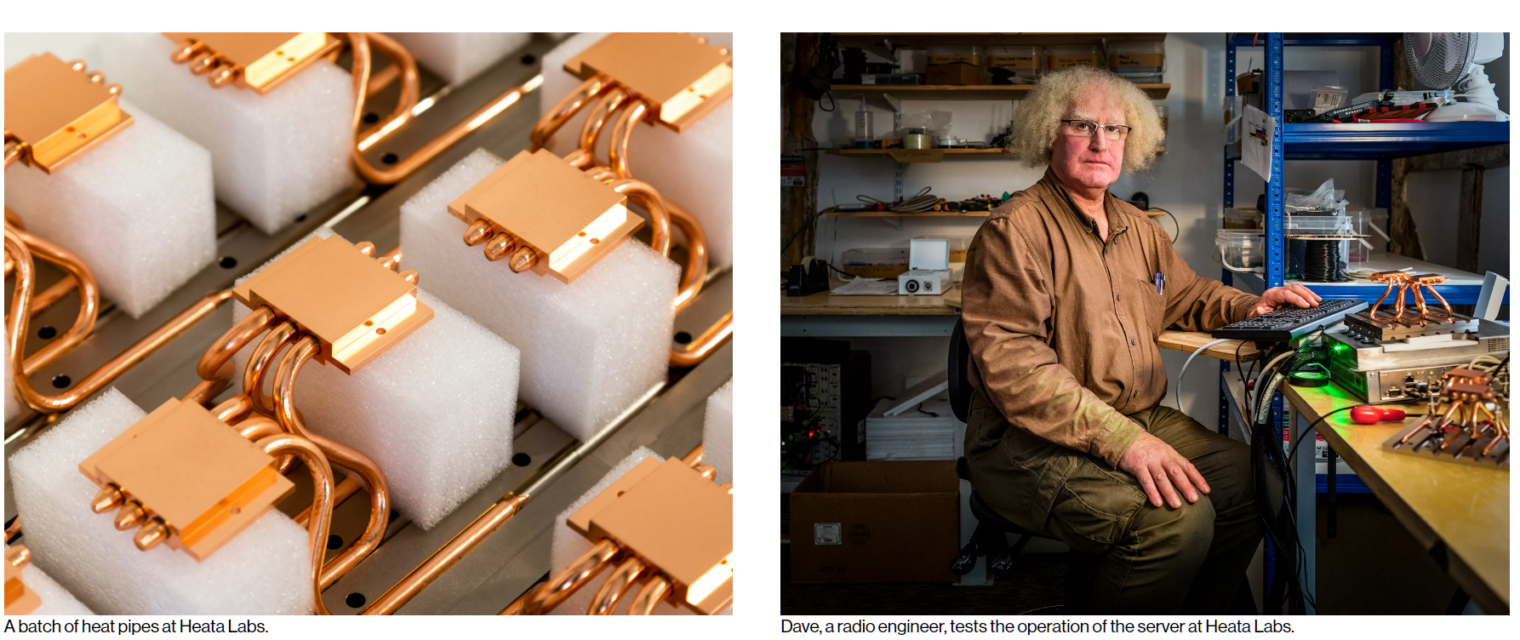Readers may recall that I love reengineered systems, e.g., Build downdraft paint booths for K-12 schools?
In Florida, people are using heat pump water heaters that also serve to cool the garage. From miserable cold/damp England, a different idea: a computer server whose waste heat is used for domestic hot water.
This is covered in a recent MIT Technology Review magazine article:
“This is where I prototyped the thermal conductor that carries heat from computer processors to the cylinder filled with water,” he says, opening his workshop door to reveal a 90-liter electric boiler. “We ran the first tests, and we understood that it could work.” Jordan is cofounder and chief technology officer of Heata, an English startup that has created an innovative cloud network where computers are attached to the boilers in people’s homes.
Next to the boiler is a computer tagged with a sticker that reads: “This powerful computer server is transferring the heat from its processing into the water in your cylinder.” A green LED light indicates that the boiler is running, Jordan explains. “The machine receives the data and processes it. Thus we are able to transfer the equivalent of 4.8 kilowatt-hours of hot water, about the daily amount used by an average family.”
Can this save our beloved planet? Absolutely!
When you sign up with Heata, it places a server in your home, where it connects via your Wi-Fi network to similar servers in other homes—all of which process data from companies that pay it for cloud computing services. Each server prevents one ton of carbon dioxide equivalent per year from being emitted and saves homeowners an average of £250 on hot water annually, a considerable discount in a region where 13% of the inhabitants struggle to afford heat.
They hired the scientist from Back to the Future:
What else is in the September/October issue? There is a 5-page article on open-source software, whose 40th anniversary is apparently now. The canceled Richard M. Stallman is credited as having started the movement, but there is no photo of him. Nor of Linus Torvalds. Nor of Guido van Rossum, the Python nerd. The editors found room for just one photo and it is of a person is not credited as having written any software, open source or otherwise:
Note that the photo caption is factually incorrect. People were using the term “open source” prior to 1998. One example is Eric Raymond‘s The Cathedral and the Bazaar. I found a version that seems to date from 1996 (since 1991 was “five years ago”).
I was one of the first GNU contributors in the mid-1980s. I had released a good deal of open-source software onto the net, developing or co-developing several programs (nethack, Emacs’s VC and GUD modes, xlife, and others) that are still in wide use today.
Note that the Deplorable Second Amendment-loving Raymond does not explain what he means by this term, but simply uses it expecting readers to understand it. Thus, it seems doubtful that the term was new in 1996.
“Tiny faux organs could crack the mystery of menstruation” is also interesting.
part of human physiology: menstruation. Heavy, sometimes debilitating periods strike at least a third of people who menstruate at some point in their lives … people with heavy periods … Many people desperately need treatments to make their period more manageable… Why some people have much heavier periods than others remains an open question. … why humans menstruate … Some labs instead use tissue removed from people who have had hysterectomies … help explain why some people are prone to miscarriages.
How long before these brilliant Scientists realize that approximately half of “people” have very light periods indeed and that there is a fairly simple test to predict whether a person falls into this category?


French startup Qarnot has been installing servers shaped like radiators in customer premises for a while. The problem is you’d have to throttle them in summer.
Wiki agrees with Phil on the issue of the history of the term “open source.”
https://en.wikipedia.org/wiki/Open_source
I have definitely used term “open source software” before 1998 even though I did not contribute to open source community
Poor Richard Stallman. He wanted software “Free as in free speech, not free beer” in times in which free speech seamed to be generally accepted value. Nowadays they say for people who value free speech: “The people who were ideological—some of them stayed quite ideological”. There is theory that they want to remove Richard Stallman so that they can water down GPL. Because GPL allows you to adhere to any later version of it, so if you water down GPL, it will be easier to progress with thechnofeudalism. (Yes, I know Yanis Varoufakis has coined the therm thechnofeudalism, and he calls himself Marxist, but you do not have to be leftie to see that there is lot of sense in what he is saying on this subject).
It might be that Christine Peterson was the first woman to coin the term ‘Open Source’, and therefore historical.